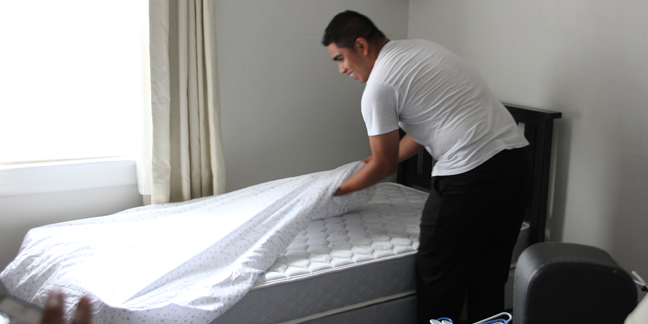 St. Joseph College Seminary opens in Charlotte
St. Joseph College Seminary opens in Charlotte
CHARLOTTE — Suitcases and cardboard boxes. Guitar cases and snacks from home. Parents looking around dorm rooms, smiling and trying not to be anxious about the children they are about to leave behind.
But for eight young men moving in to St. Joseph College Seminary, Aug. 7 was no ordinary college moving-in day. It also marked the first step on a long journey of discernment and study of the priesthood. The new minor seminary opens this month on the campus of St. Ann Church on Park Road.
St. Joseph College Seminary is for undergraduate men considering the priesthood, one step before they contemplate enrolling in a major seminary for more specific priestly formation. Enrolled in the diocese's seminarian program, the men will work toward a bachelor's degree in philosophy at Belmont Abbey College.
A summer thunderstorm that rolled by did not wipe the smiles or slow the pace of the young men and their families as they hustled boxes and bags from their cars into the small brick building behind St. Ann School.
"We are so proud of him," said Matthew Dimock about his son Matt, who just graduated from Charlotte Catholic High School. As he helped his son unload and unpack his things, Dimock said he feels overwhelmed by his son's desire to follow God.
Similar sentiments were echoed by the other parents.
Kathleen Harrison said of her son Matt, who just graduated from Christ the King High School, "You know what he said to us the other day? He said he was following Jesus into the seminary, and if he ends up leaving it's because he was following Jesus out."
Her son's desire to listen and discern God's will in his life makes her heart swell, she said.
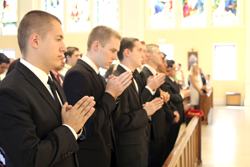 Move-in day began with Mass at St. Ann Church, offered by Father Matthew Kauth, rector of the new college seminary. In his homily, Father Kauth entreated the young men to take heart and follow Christ with courage and faith, citing the college's motto "Noli timere" – "Do not be afraid."
Move-in day began with Mass at St. Ann Church, offered by Father Matthew Kauth, rector of the new college seminary. In his homily, Father Kauth entreated the young men to take heart and follow Christ with courage and faith, citing the college's motto "Noli timere" – "Do not be afraid."
Those words from Christ appeared in the day's Gospel reading from Luke Chapter 12, and Father Kauth noted it as another sign of divine providence along what has been a bumpy road for the college seminary up to this point.
Courage and action are needed to follow God, he emphasized, noting the readings of the day (Wisdom 18:6-9 and Hebrews 11:1-2, 8-12) talk about the courage of the Israelites and the faithfulness of Abraham in following God toward the Promised Land. People who wish to follow God – particularly those who are called to shepherd souls to heaven – must be similar men of action and courage, he said.
"Courage is not something that a man has because he doesn’t have any fear. On the contrary, it's when he steels his heart and keeps his eyes fixed, and says, 'I will do this anyway, and I will trust Him who is trustworthy.' Courage is not meant for someone who does not act. It is the one who acts that needs it."
Courage is for those who leave a comfortable, worldly life to pick up their crosses and follow God – those "who have no idea (thanks be to God) what's in store for you," he continued, turning and smiling as he gestured at the eight young men in the pew in front of him.
Following God is not for the faint-hearted, he said, and it means leaving behind those things that the world considers important and valuable. But God, who is always faithful and trustworthy, will reward those who are obedient to Him.
"Every action you take is going to be measured by that: what you wear, how you eat, how long you sleep – eh?" Father Kauth said, again turning to the young men.
"Step by step, you will leave things behind," he said, just as a hiker on a long journey gets rid of anything he does not need to get home. "So I say to you, move forward … noli timere."
The eight students will live in private, dormitory-style rooms in the old St. Joseph Monastery, former home of the Poor Clares of Perpetual Adoration. While the name has changed, St. Joseph remains the spiritual head of the place, with images of him in prominent places throughout.
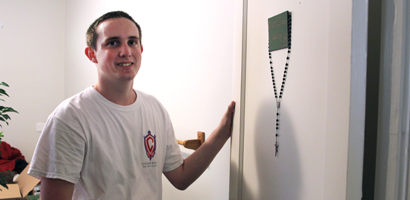 Matt Dimock points out the nameplate on each door denoting various names for St. Joseph.Each room features a twin bed, desk, bookshelf and sink. And on each door, a nameplate features one of the names for St. Joseph: "Christi defensor sedule" ("Watchful defender of Christ"), "Joseph fidelissime" ("Joseph most faithful"), "Dei Genetricis sponse" ("Spouse of the Mother of God"), etc.
Matt Dimock points out the nameplate on each door denoting various names for St. Joseph.Each room features a twin bed, desk, bookshelf and sink. And on each door, a nameplate features one of the names for St. Joseph: "Christi defensor sedule" ("Watchful defender of Christ"), "Joseph fidelissime" ("Joseph most faithful"), "Dei Genetricis sponse" ("Spouse of the Mother of God"), etc.
After moving in, the students will attend an orientation session on Monday followed by 10 days of Latin immersion before classes begin at Belmont Abbey College later this month.
While attending classes they will live in community, apart from the rest of the student body, and will follow a "rule of life" appropriate for this level of seminary, including daily Mass, the Liturgy of the Hours, the rosary, spiritual direction and conferences.
They will start each day at 5:45 a.m. Starting at 6:15 a.m., they will have a half hour of private prayer, followed by Lauds (Morning Prayer) and Mass.
On Mondays, Wednesdays and Fridays they will travel to Belmont Abbey College via a newly donated Chevy Suburban, dubbed the "Suburbi et orbi," for classes from 9 a.m. to noon. On Tuesdays and Thursdays, they will have classes at the college seminary.
After lunch, they will have recreation and free time back at the college seminary until Vespers, praying of the rosary and dinner. From 7 to 9 p.m. there will be a "minor silence," during which time the men will study, and then at 9 p.m. they will gather for Compline (Night Prayer) followed by a "grand silence" that will remain unbroken until after breakfast the next day.
This monastic schedule, which emphasizes both an interior and exterior quiet, is purposeful, Father Kauth said.
"I wanted to capitalize both on the fact that they're at a Benedictine institution but also, when you have a college this small … you try to cultivate a ground of silence for prayer to be able to permeate their life. Because they're boys – they're going to make noise and be loud. They need to cultivate that (silence) right from the very beginning, or they can't hear anything. They can't begin to listen to the Lord."
 Peter Rusciolelli brought lots of snacks from home, presents from his family.
Peter Rusciolelli brought lots of snacks from home, presents from his family.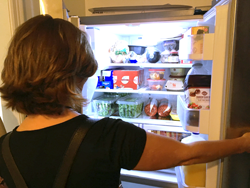 Kathleen Harrison checks out the fridge during her tour of the college seminary, where her son Matt has enrolled.Besides the core classes they will take at Belmont Abbey College, the young men will study philosophy with Dr. Matthew Siebert, recently hired by the seminary and the abbey specifically to teach the young men. They will also take theology classes with Father Kauth, and sacred music classes with Thomas Savoy, director of the Carolina Catholic Chorale and music director at St. Thomas Aquinas Church in Charlotte.
Kathleen Harrison checks out the fridge during her tour of the college seminary, where her son Matt has enrolled.Besides the core classes they will take at Belmont Abbey College, the young men will study philosophy with Dr. Matthew Siebert, recently hired by the seminary and the abbey specifically to teach the young men. They will also take theology classes with Father Kauth, and sacred music classes with Thomas Savoy, director of the Carolina Catholic Chorale and music director at St. Thomas Aquinas Church in Charlotte.
The college seminary will remain on the St. Ann campus probably for the next two years, Father Kauth said.
The Poor Clares' old home was renovated for the college's needs, with the former gift shop at the entrance converted into a formal drawing room for visitors. Furniture was mostly scavenged from consignment sales and auctions, while donations also helped especially with filling the pantry. The young men did all the painting and yard work, he said.
"There's a lot of sweat equity in this, so we didn't have to spend a ton of money," he said.
Fundraising for a permanent home for the college has reached just over $4 million, he said. A permanent site has not yet been chosen, he said.
Despite the delay in finding a permanent site, so far the college seminary has already exceeded Father Kauth's expectations, he said. The program is at full capacity with eight students in the building's eight rooms.
"I thought we'd have three or four, maybe, our first year," he said.
Seven of the eight young men are from the Diocese of Charlotte. Some are just starting college life, while others have completed some college classes.
Because the young men will remain in the diocese during their studies, Father Kauth said he wants them to interact regularly with people.
"We'll travel around," he said. "Any priest that wants us to come, we'll come. So we won't be isolated to St. Ann's."
— Patricia L. Guilfoyle, editor
Photos of the college seminary
 The community gathering room
The community gathering room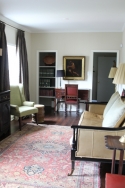 The formal sitting room for visitors
The formal sitting room for visitors The kitchen
The kitchen The refectory
The refectory
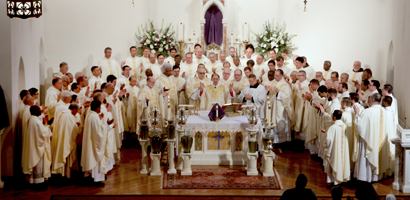 Bishop Jugis preaches unity, forgiveness at Chrism Mass as priests renew promises
Bishop Jugis preaches unity, forgiveness at Chrism Mass as priests renew promises
CHARLOTTE — Bishop Peter Jugis took special care during this Jubilee Year of Mercy in the Church to emphasize unity during his homily at the annual Chrism Mass at St. Patrick Cathedral. More than 90 priests from around the Diocese of Charlotte attended the Mass on a fine spring day, renewing their priestly promises to Holy Mother Church and their bishop.
Bishop Jugis addressed his brother priests during his remarks, reminding them that there is unity in Christ.
“This coming together as brother priests at the Chrism Mass especially demonstrates in a very visible way the unity of the priesthood in Christ. No matter where we serve in the diocese, wherever we exercise our priestly ministry in many different locations, when we come to this Chrism Mass, we see again what we knew all along – even though we may be separated geographically by the distance of miles – we see once again made manifest that we are all brothers in one priesthood and are united as one,” he reminded them.
Bishop Jugis stressed to them, as Jesus did to His disciples that, “‘You are all brothers!’ How true this is of the priesthood…What is it that unites us as brothers? The grace of the sacrament of holy orders. There are nearly 100 men here today who go by the same name, 'alter Christus.' We all have the same name. How’s that for unity?
“Our love for Jesus Christ unites us as brothers, our love for the priesthood unites us as brothers. Our love for the Church unites us as brothers. Our love for the work of salvation unites us as brothers. Our love for each other – our love for each other – unites us as brothers. ‘You are all brothers,' Jesus tells us.”
Bishop Jugis addressed how "our old enemy" original sin has left divisive tendencies in the human heart, a tendency to separate from one another.
“The remedy we know for all of those tendencies that original sin has left behind in us, the remedy is love. There can be no true unity without unconditional mutual love, and the readiness to serve each other generously and an ability to forgive up to seventy times seven.”
He explained that priests are all brothers in the priesthood because they are all brothers of Christ first and foremost.
“What a great name for a religious order. Brothers of Christ. And in fact it is the name of a religious order. It is a description of the order of the priesthood.”
Bishop Jugis emphasized that every day priests pray to remain deeply united to Jesus when they celebrate Mass, and especially before they receive Holy Communion, praying to be always faithful to the commandments and to never be separated from Christ.
“He is the source of our unity, our brother Christ. It is a very special relationship we have with the Lord to not only call Him Master and Teacher, Savior, Redeemer, but our brother in the priesthood.”
Before renewing their priestly promises, Bishop Jugis recalled that he and the priests gathered exercise their ministry in a divided, quarrelsome American society, but the Chrism Mass manifests what is always present among them – that although the society is quarrelsome and divided, he and his brother priests see unity in Christ the High Priest as His brother priests.
Concelebrating the Chrism Mass were Benedictine Abbot Placid Solari of Belmont Abbey; Monsignor Mauricio West, vicar general and chancellor of the diocese; Father John Putnam, judicial vicar of the diocese; and 97 more diocesan and religious order priests who gathered around the altar for the Liturgy of the Eucharist.
All the priests also stood during the blessing of the sacred chrism with hands outstretched, joining with Bishop Jugis in prayer as he performed the blessing rite.
The oils blessed during the chrism Mass are used in the sacraments of baptism, confirmation, anointing of the sick, as well as for ordination of priests and the consecration of churches.
Bishop Jugis stirred balsam into the chrism to give it a sweet perfume and breathed the "breath of the Holy Spirit" over the chrism.
In his final remarks before the conclusion of the Chrism Mass, Bishop Jugis shared that there is an increased interest among young people in the diocese for the priesthood and religious life, and he encouraged the priests and all gathered to promote vocations.
“The college seminary is our response to increased interest in that age group. I ask you to please continue to talk about the priesthood and the consecrated life to the young people in your faith formation classes and in your youth ministry programs, because that personal contact makes all the difference when a young person is considering special service to the Church,” he concluded.
After Mass, deacons divided the blessed oils into smaller oil stocks that will be distributed to all 92 parishes and missions across the diocese for use in sacramental celebrations throughout the upcoming year.
-- SueAnn Howell, senior reporter

